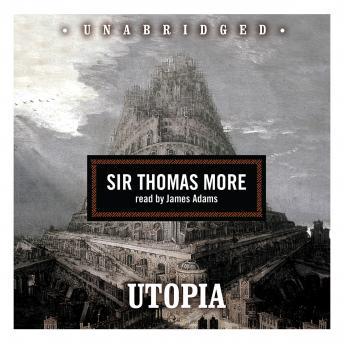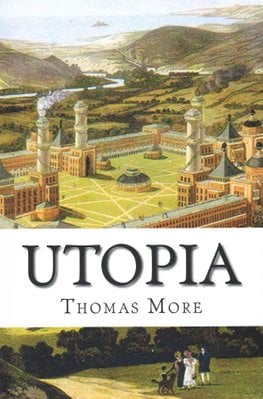


More extends the communism of property to all citizens, reflecting his familiarity with the early Christian society described in the Biblical Acts of the Apostles (Acts 2.44-45, 4.32-35). Furthermore the Utopians are depicted as readily accepting of Christian doctrine when introduced to such by European visitors.

Utopia also reflects More's commitment to Christianity, as the people are united by belief in a Supreme Being, a priest administers the island's religious affairs, and belief in what is essentially the Christian Afterlife is mandatory. It has few laws, no lawyers and rarely sends its citizens to war, but hires mercenaries from among its war-prone neighbours (these mercenaries were deliberately sent into dangerous situations in the hope that they would be killed, thus ridding the world of a parasite). The evils of society, eg: poverty and misery, are all removed. It is a perfect version of The Republic where the beauties of society reign (eg: equalism and a general pacifist attitude), although its citizens were all ready to fight if need be. Utopia is largely based on Plato's Republic. Thomas More depicts a rationally organized society, through the narration of an explorer who discovers it - Raphael Hythlodaeus. In this original context, the word carried none of the modern connotations associated with it. The word "utopia" was created to suggest two Greek neologisms simultaneously: outopia (no place) and eutopia (good place). The term "utopia" is combined from two Greek words ? "no" (ou) and "place/land" (topos), thus meaning "nowhere" or more literally, "no-place/no-land". The term utopia was coined by Thomas More as the title of his Latin book De Optimo Reipublicae Statu deque Nova Insula Utopia (circa 1516), known more commonly as Utopia. Utopia, in its most common and general positive meaning, refers to the human efforts to create a better, or perhaps perfect society. In this marvelous book everyone is equal and in a loving marriage.-Submitted by Anonymous It is the world with no problems, there is no where, no unloving relationships, and no classification between societies and different classes. This book shows a fictional island society and its customs. Well it was at least in Thomas More's view of the perfect world. It is a world of dreams, a world beyond existence, it is the "perfect" world. To make a long story short, I think it is a great book because of the actual time it was written, since most pieces of literature written at that time were either lost or destroyed. It is also quite remarkable to see that the story begins to be more and more interesting after More and Giles come back from dinner. Moreover, the use of imagery in Book I is quite fascinating, including the constant references to Roman and Greek myths and beliefs. All More tries to do is convey his own views of how society should be through Raphael. Truthfully, the book is quite easy to understand. Although most of the characters are fictional, it is intriguing to learn about the true values of European societies during the 16th century, when More actually wrote the book (although many scholars believe that the exact year was 1515). Utopia is a classic masterpiece that conveys More's vivid imagination of the Island of Utopia.


 0 kommentar(er)
0 kommentar(er)
